 |
WEST POLAND CASTLES, PALACES, ABBEYS PHOTO GALLERY - PART 1 |
Bill Biega's Photo Collection |
|
Click on any illustration with colored border to see it full size. Then click on "Back" button to return to this page.
Western Poland, Wielkpolska, is where the Polish nation originated. It is a rolling plain with many forests and lakes, and numerous beautiful palaces, manors and castles. The photos on this page are arranged in groups corresponding to the itineraries on the travel guide West Poland Tour. Those who can read Polish may find detailed descriptions in Prof. Mazurek's wonderful guide. There is a brief English summary, but in any case you may find the pictures and plans interesting. | IMPORTANT LINKS
Tour of Wielkopolska Photos of Gniezno Photos of Rydzyna Index to tour pages Mark Wojciechowski's photos of Poland, Most of the photos on this page are from that wonderful collection, with permission. | |
|
Poznan, was the capital of Poland in the 11thC. In the old cathedral, which stands on an island in the river Warta, you may see the sarcophaguses of the first Polish kings.
The 16thC. Renaissance style town hall, Ratusz, reigns over the large market square in the center of the old town. The square is surrounded by the dwellings of the rich merchants, all decorated with wall paintings and sculptures. An old fountain nestles under the walls of the Ratusz. After viewing other historic buildings, we head in a south-easterly direction to our next destinations. |

|
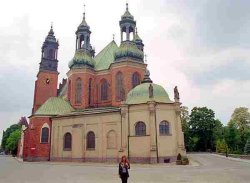
|
 Photo B.Biega Photo B.Biega
|
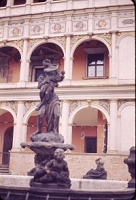 Photo B.Biega Photo B.Biega
| |
| Kórnik, near Poznan, has miraculously survived the wars with its great art collection intact. A moat separates the castle from a park with a rich collection of trees and shrubs from all over the world. The inlaid floors were made in the 19thC from many varieties of wood arranged in exquisite designs, all the work of local artisans. |
 Photo B.Biega Photo B.Biega
|
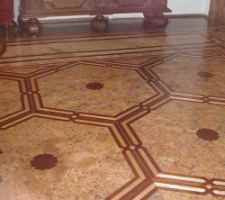 Photo B.Biega Photo B.Biega
|
|
Smielówis a palace 40km southeast of Poznan, located within a nature preserve.
Goluchów, close to Kalisz, is built in a completely different style, at the end of the 19th century. It also has a nature park with żubry, the Polish equivalent of the American bison. |
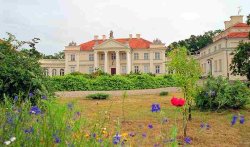
|

|
| Returning to Poznan, we now head in a southerly direction to Rogalin, the palace of the Raczynski family. It was built in the second half of the 18th.C in the classic-baroque style. In one wing there is a collection of paintings by Polish artists.
In another wing a museum to Edward Raczynski, long time ambassador in Great Britain, foreign minister and finally president of the government in exile. Seen here is a view from the main entrance, and then from the ornamental garden in the rear. It is located in a large park which includes a large number of ancient oak trees. At the east end, on a hill, a chapel in the classic Roman style houses the crypt containing the tombs of the Raczynski family. |
 Photo B.Biega Photo B.Biega
|

|

|
 Photo B.Biega Photo B.Biega
|
|
11 kilometers west of Srem, on a side road, within a 22ha. nature preserve, you can see the Turew palace built in the 19thC. by Dezyder Chlapowski.
A little further to the west is the late 18thC. palace Racot , now a stud farm |
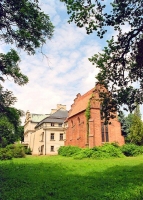
|
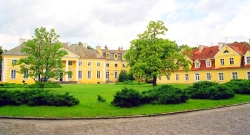
|
|
Continue southward and as you pass the village of Lubin you wee the towers of the 17thC. Benedictine monastery over to the left.
Just east of the town of Gostyn, you should visit the 18thC. Baroque church of the 16thC. monastery to see the richly decorated altars and the gorgeous frescoes. |

|


|
|
South of Gostyn, within just a few kilometers of each other, there is a number of palaces. The furthest east is Pępowo. This palace and Gębice close by were both built in the early 19thC.
Continue westward to another early 19thC. palace Rokosowo in the neo-Gothic style. |
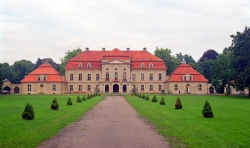
|
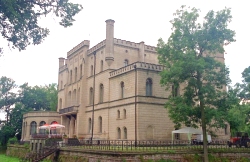
|
| The palace in
Pawłowice is much larger and older than the previous ones. It was built in the second half of the 18thC. in the classic Baroque style for Maximilian Miełzynski.
However the best is yet to come. The pearl of West Poland's castles is Rydzyna Castle, therefore a special page is devoted to it, On the way to it pass through the village Dąbcze to see one of the few remaining timbered churches. |

|
 Photo B.Biega Photo B.Biega
|
|
Leszno, is 12km north of Rydzyna. The town hall and some of the houses in the main square date back to the 18thC. The palace of the Leszczynski family is now a local government office building.
Continue 46km south-west to Głogów, an ancient fortress. You can see parts of the 13th and 16thC. fortifications. |
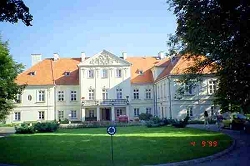
|
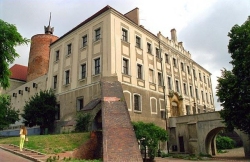
|
Return to Top of page or continue to part 2 of West Poland photos
Return to Photo Album Index.
Go to Travel index.